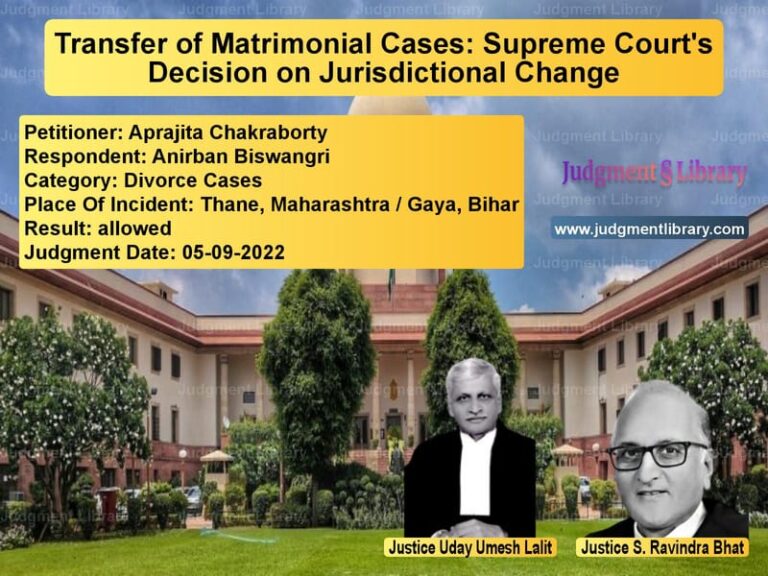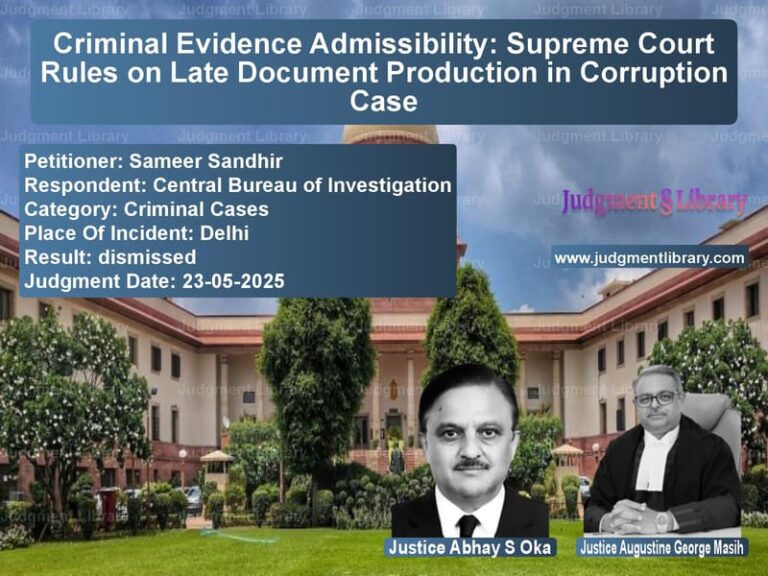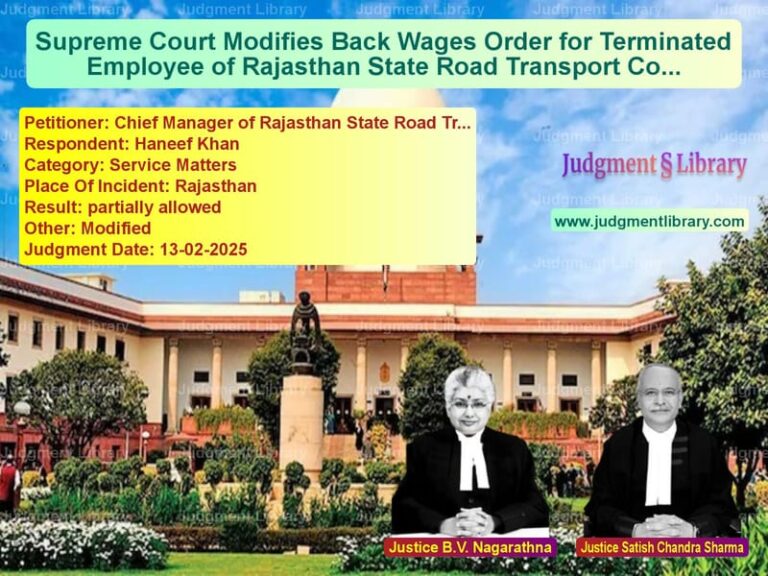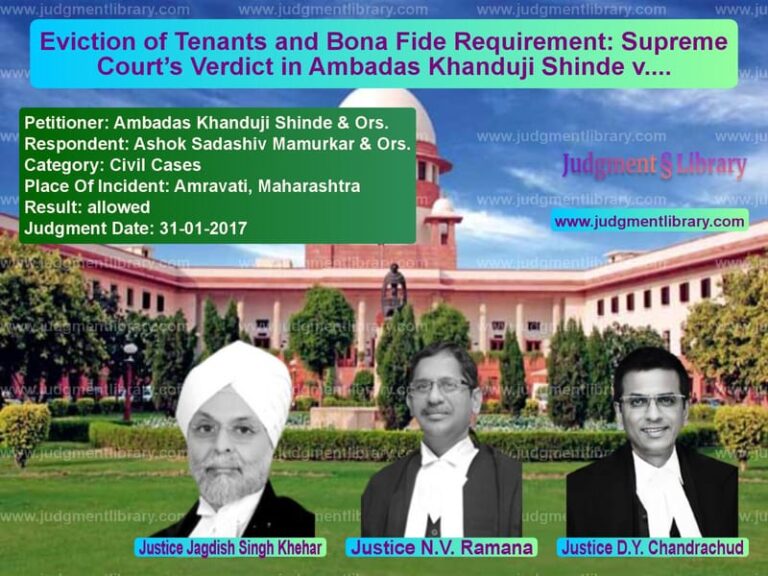Consumer Protection and Commercial Transactions: Supreme Court’s Key Ruling on Banking Disputes
The case of Shrikant G. Mantri vs. Punjab National Bank sheds light on the intersection of commercial banking transactions and consumer rights under the Consumer Protection Act, 1986. The Supreme Court, in its detailed analysis, examined whether a stockbroker availing an overdraft facility for business purposes could qualify as a ‘consumer’ and seek relief under the Act.
The National Consumer Disputes Redressal Commission (NCDRC) had previously dismissed the appellant’s complaint on the ground that his transactions were commercial in nature. The Supreme Court, upholding this decision, elaborated on the legislative intent behind excluding commercial disputes from consumer protection laws.
Background of the Case
The appellant, Shrikant G. Mantri, a stockbroker by profession, had opened a bank account with the erstwhile Nedungadi Bank Ltd. in 1998. Over time, he availed an overdraft facility, which was increased multiple times, reaching Rs. 6 crore. The facility was secured against pledged shares.
In 2001, following a steep decline in the stock market, the bank asked the appellant to provide additional security. Consequently, he pledged 37,50,000 equity shares of an unlisted company, Ansal Hotels Ltd., which later merged with ITC Ltd., converting the shares to 3,75,000 shares of ITC.
Due to financial distress, the appellant defaulted, leading to recovery proceedings initiated by the bank. The matter was later settled through a One-Time Settlement (OTS), with the appellant paying Rs. 2 crore, following which the bank issued a ‘No Dues Certificate.’ However, the appellant claimed that despite the settlement, the bank had failed to return the pledged shares.
Key Legal Questions
The legal debate centered on two critical issues:
- Whether the overdraft facility availed by the appellant constituted a ‘service’ under the Consumer Protection Act, 1986.
- Whether the appellant, being a stockbroker, could be considered a ‘consumer’ under Section 2(1)(d) of the Act, given that the overdraft facility was used for professional trading activities.
Arguments of the Petitioner
Senior Advocate Shyam Divan, representing the appellant, made the following submissions:
- The appellant availed the overdraft facility as a means of self-employment and should qualify as a consumer under the Act.
- The pledged shares were meant solely to secure the overdraft facility and should have been returned upon settlement.
- Since the appellant was engaged in the stockbroking business for his livelihood, the exclusion of ‘commercial transactions’ should not apply in this case.
- The appellant’s livelihood depended on stock trading, and without access to financial assistance, it was impossible to sustain his profession.
Arguments of the Respondent
Senior Advocate Dushyant Dave, appearing for Punjab National Bank, countered with the following points:
- The appellant was a stockbroker conducting large-scale trading, making his transactions commercial rather than consumer-centric.
- The overdraft facility was availed to expand business operations and maximize profit, not for self-employment.
- If banking transactions like overdraft facilities were brought under the purview of consumer protection laws, financial institutions would be overwhelmed with litigation.
- The Commission had rightly ruled that the appellant was not a consumer under the law.
Supreme Court’s Analysis
The Supreme Court examined the legislative framework and judicial precedents concerning the definition of a ‘consumer.’ The key findings included:
- Section 2(1)(d) of the Consumer Protection Act excludes individuals who avail services for commercial purposes from being considered consumers.
- The term ‘commercial purpose’ refers to transactions undertaken with a view to generating profits rather than subsistence.
- While the Act does allow an exception for self-employment and earning a livelihood, the appellant’s case did not fall under this category as he was engaged in an established stockbroking business.
- The appellant’s overdraft facility was used for large-scale transactions and was not a matter of self-employment.
The Court relied on several landmark cases, including Laxmi Engineering Works vs. P.S.G. Industrial Institute and Paramount Digital Colour Lab vs. AGFA India Pvt. Ltd., to reinforce the distinction between self-employment and commercial enterprise.
Key Observations from the Judgment
The Court ruled:
“If a person avails of a service for a commercial purpose, he will have to establish that the services were availed exclusively for the purpose of earning his livelihood by means of self-employment. The appellant, being an established stockbroker, does not fall into this category.”
The judgment emphasized that:
- Stockbrokers dealing in high-value financial transactions cannot claim consumer protection under the Act.
- Allowing such claims would blur the line between consumer disputes and business-to-business transactions.
- The Act aims to protect individuals from unfair trade practices, not to provide a platform for commercial litigation.
Final Judgment
The Supreme Court upheld the Commission’s decision, concluding that the appellant did not qualify as a consumer. The appeal was dismissed, but the appellant was granted liberty to seek legal remedies in appropriate forums.
Conclusion
This ruling reaffirms that consumer protection laws are designed to safeguard individuals from unfair trade practices rather than to address business-to-business disputes. The Supreme Court’s interpretation provides clarity on the exclusion of commercial transactions from the purview of consumer protection laws.
Petitioner Name: Shrikant G. Mantri.Respondent Name: Punjab National Bank.Judgment By: Justice B.R. Gavai, Justice L. Nageswara Rao.Place Of Incident: Mumbai.Judgment Date: 22-02-2022.
Don’t miss out on the full details! Download the complete judgment in PDF format below and gain valuable insights instantly!
Download Judgment: shrikant-g.-mantri-vs-punjab-national-bank-supreme-court-of-india-judgment-dated-22-02-2022.pdf
Directly Download Judgment: Directly download this Judgment
See all petitions in Contract Disputes
See all petitions in Consumer Rights
See all petitions in Debt Recovery
See all petitions in Judgment by B R Gavai
See all petitions in Judgment by L. Nageswara Rao
See all petitions in dismissed
See all petitions in supreme court of India judgments February 2022
See all petitions in 2022 judgments
See all posts in Civil Cases Category
See all allowed petitions in Civil Cases Category
See all Dismissed petitions in Civil Cases Category
See all partially allowed petitions in Civil Cases Category







